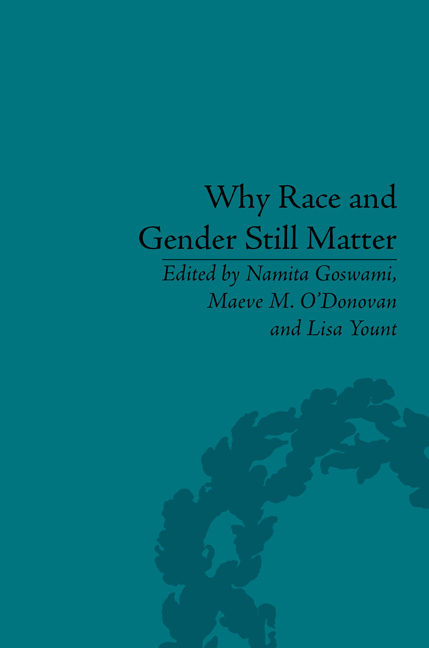Book contents
- Frontmatter
- CONTENTS
- Dedication
- Acknowledgements
- List of Contributors
- Introduction to Why Race and Gender Still Matter: An Intersectional Analysis
- Part I Defining Intersectionality
- 1 Race Women, Race Men and Early Expressions of Proto-Intersectionality, 1830s–1930s
- 2 Past as Prologue: Intersectional Analysis from the Nineteenth Century to the Twenty-First
- 3 Making Sense: The Multistability of Oppression and the Importance of Intersectionality
- 4 Reinvigorating Intersectionality as a Provisional Concept
- 5 ‘Big Red Sun Blues’: Intersectionality, Temporality and the Police Order of Identity Politics
- Part II Doing Intersectionality
- Notes
- Index
3 - Making Sense: The Multistability of Oppression and the Importance of Intersectionality
from Part I - Defining Intersectionality
- Frontmatter
- CONTENTS
- Dedication
- Acknowledgements
- List of Contributors
- Introduction to Why Race and Gender Still Matter: An Intersectional Analysis
- Part I Defining Intersectionality
- 1 Race Women, Race Men and Early Expressions of Proto-Intersectionality, 1830s–1930s
- 2 Past as Prologue: Intersectional Analysis from the Nineteenth Century to the Twenty-First
- 3 Making Sense: The Multistability of Oppression and the Importance of Intersectionality
- 4 Reinvigorating Intersectionality as a Provisional Concept
- 5 ‘Big Red Sun Blues’: Intersectionality, Temporality and the Police Order of Identity Politics
- Part II Doing Intersectionality
- Notes
- Index
Summary
Introduction
Oppression is a multistable social phenomenon. Most, if not all, social phenomena are multistable. However, for this chapter, it is enough to consider the multistable nature of oppression. To say that oppression is multistable is to indicatethat oppression in a given society will have multiple ways one can understand it, and these multiple ways will be apodictically certain. That is to say, one's certitude that oppression simply is a particular way, originates from such and such a place, or can be understood according to such and such an orientation can be experientially fulfilled time and again and appear beyond dispute. At this point, many will question how one is supposed to ‘make sense’ of oppression when it can, quite literally, appear differently to everyone, whether according to group memberships with hermeneutical impact, possessing multiple such memberships, or personal identification that admits of fragmentation. It is here where intersectionality becomes an important tool as a mechanism for the construction of social facts. In this chapter, I claim that intersectionality, by virtue of its demand for open-ended consolidation, is a valuable mechanism for the constitution of social facts concerning oppression, where oppression is understood as a multistable social phenomenon. Open-ended consolidation, in this context, refers to the act of relating seemingly unrelated bits of information to construct richer, fuller narratives of our social worlds.
Information
- Type
- Chapter
- Information
- Why Race and Gender Still MatterAn Intersectional Approach, pp. 43 - 58Publisher: Pickering & ChattoFirst published in: 2014
